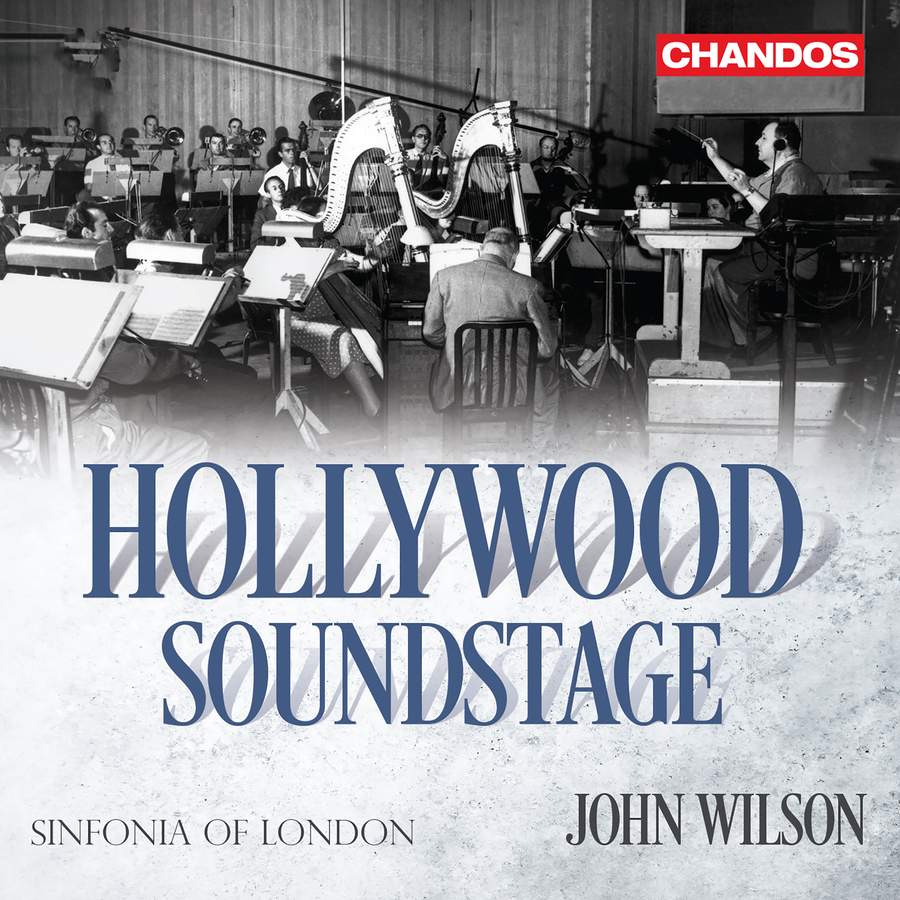Hollywood Soundstage
View record and artist detailsRecord and Artist Details
Genre:
Orchestral
Label: Chandos
Magazine Review Date: AW22
Media Format: Super Audio CD
Media Runtime: 61
Mastering:
DDD
Catalogue Number: CHSA5294

Tracks:
| Composition | Artist Credit |
|---|---|
| (The) Private Lives of Elizabeth and Essex, Movement: Overture |
Erich Wolfgang Korngold, Composer
John Wilson, Conductor Sinfonia of London |
| Laura, Movement: Theme |
David Raksin, Composer
John Wilson, Conductor Sinfonia of London |
| (The) Wizard of Oz, Movement: Suite |
Harold Arlen, Composer
John Wilson, Conductor Sinfonia of London |
| My Fair Lady, Movement: The Transylvanian March |
Frederick Loewe, Composer
John Wilson, Conductor Sinfonia of London |
| My Fair Lady, Movement: The Embassy Waltz |
Frederick Loewe, Composer
John Wilson, Conductor Sinfonia of London |
| Now, Voyager, Movement: Suite |
Max Steiner, Composer
John Wilson, Conductor Sinfonia of London |
| (The) Sandpiper, Movement: Main Title |
Johnny Mandel, Composer
John Wilson, Conductor Sinfonia of London |
| Rebecca, Movement: Suite |
Franz Waxman, Composer
John Wilson, Conductor Sinfonia of London |
| 'How to Marry a Millionaire, Movement: Street Scene |
Alfred Newman, Composer
John Wilson, Conductor Sinfonia of London |
Author: Edward Seckerson
It was inevitable – and only appropriate – that John Wilson’s reborn Sinfonia of London should celebrate their prolific past (and specifically the 300 film soundtracks they recorded) by returning to the proverbial sound stage with the man who has lived, breathed and respected this repertoire for so long.
So a collective swoon, if you will, for the young Bette Davis and swarthy Errol Flynn as they sweep into frame on the crest of a composer whom Wilson has fast adopted as his own, Erich Korngold. Korngold’s sumptuous score for The Private Lives of Elizabeth and Essex (1939) might almost have been written before the movie was even a gleam in the producer’s imagination. It plays like a template for all such romantic pageants, full of splendour, swagger and courtly pomp, and string-writing of unbridled passion. It sounds expensive.
There’s no way that one can describe the Sinfonia of London string sound here without using the word ‘saturating’. It’s partly in the sound but it’s mostly in the phrasing and the style that Wilson’s very particular kind of ‘authenticity’ is born. He has listened long and hard to the way the Hollywood studio orchestras played this music and has recreated it to the manner born for our technologically advanced times. You can see at once why those classic movie screenings with live orchestra are so popular. We long to hear these great scores as they first sounded on the Hollywood sound stages, undimmed and undiminished by age.
Another Bette Davis favourite and one beloved by all aficionados of the genre is Max Steiner’s achingly enriching score for Now, Voyager. It is really quite uncanny how the sentiment of the movie is somehow inbred into the music. You can’t hear it without ‘seeing’ it, you can’t hear any of its now immortal lines without hearing that main title theme. It’s John Wilson’s absolute favourite and it’s the centrepiece here. All I would say about the spirit it enshrines is that there is a passage of great inwardness and intimacy about two-thirds through this suite (roughly chronological with the drama) where one feels the realisation dawn that the love Davis’s Charlotte feels for the married man who has given her reason to live (Paul Henreid) again just cannot be. If you like, it’s the musical equivalent of that immortal valedictory line: ‘Oh, Jerry, don’t let’s ask for the moon; we have the stars.’
For the rest (and it reflects Wilson’s eclectic taste in the genre), Franz Waxman’s score for Hitchcock’s Oscar-winning Gothic romance Rebecca (1940) memorably invokes the ghostly presence of Daphne du Maurier’s deceased heroine using the shivery Novachord (a precursor to the synthesiser); there’s young Judy Garland’s sojourn to Oz, where the switch from black-and-white into Technicolor for sure has an aural equivalent in composer and arranger Herbert Stothart’s underscoring. There’s a certain irony in the fact that Stothart and not the composers of the now immortal song ‘Over the rainbow’ (Arlen and Harburg) walked off with the Oscar for essentially dressing it up so gorgeously.
Speaking of immortal songs, Johnny Mandel’s main title for the pretty ghastly Vincente Minnelli movie The Sandpiper (plainly an Elizabeth Taylor/Richard Burton vanity project) became a much-covered classic song, ‘The shadow of your smile’, once it had acquired some words (the inimitable solo trumpet of Mike Lovatt doesn’t need those, of course); and where would Otto Preminger’s 1944 film noir Laura be without David Raksin’s sinuous theme, or indeed Andy Wood’s sultry muted trombone solos in this incarnation? Preminger wanted Gershwin’s ‘Summertime’ or Ellington’s ‘Sophisticated lady’. Raksin came up with something equally iconic in a single weekend.
Discover the world's largest classical music catalogue with Presto Music.

Gramophone Digital Club
- Digital Edition
- Digital Archive
- Reviews Database
- Full website access
From £8.75 / month
Subscribe
Gramophone Full Club
- Print Edition
- Digital Edition
- Digital Archive
- Reviews Database
- Full website access
From £11.00 / month
Subscribe
If you are a library, university or other organisation that would be interested in an institutional subscription to Gramophone please click here for further information.




